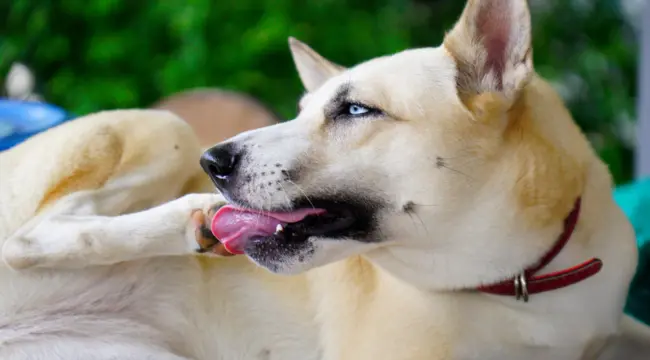
Have you ever caught your dog chewing paws and wondered what’s going on? While occasional licking and chewing of paws is normal for dogs, excessive or continuous chewing may indicate an underlying issue requiring attention. It can be quite alarming to see your furry friend gnawing at their feet, sometimes even until they’re raw and bleeding. This behavior can be caused by various factors such as allergies, pain, or anxiety.
Thankfully, there are many ways to help your dog. In this blog, we’ll explore why dogs chew their paws, discuss effective treatment options, and provide preventive measures to ensure your pup remains comfortable and healthy. Understanding the reasons behind your dog’s paw chewing is crucial for finding the right solution. Let’s dive in!
Key Takeaways:
- Excessive paw chewing may indicate underlying issues like allergies, pain, or anxiety.
- Dogs may chew their paws due to conditions such as pododermatitis, grooming issues, or stress.
- Always consult a veterinarian for personalized advice and to address any persistent or concerning paw chewing behavior in your dog.
Why Do Dogs Chew Their Paws?
Dogs chewing their paws can be perplexing and worrying for pet owners. Understanding the reasons behind this behavior is key to finding the right solution and ensuring your dog’s comfort and health.
Allergies
Just like us, dogs can have allergies that make them itchy. These allergies can be caused by:
- Food: Some dogs are allergic to specific ingredients in their food, such as certain proteins, grains, or additives.
- Environmental Factors: Pollen, mold, and dust can trigger allergic reactions in dogs.
- Chemicals: Cleaning products, lawn treatments, and other chemicals can irritate a dog’s skin and cause them to chew their paws.
When a dog has an allergic reaction, their paws can become itchy and uncomfortable, leading them to chew and lick for relief.
Anxiety
Dogs sometimes chew their paws due to anxiety or stress. This behavior is similar to how humans might bite their nails or fidget when they’re nervous. Anxiety in dogs can be caused by:
- Separation Anxiety: Being left alone for long periods can cause stress.
- Changes in Environment: Moving to a new home or changes in routine can be unsettling.
- Lack of Stimulation: Boredom and lack of physical or mental stimulation can lead to anxious behaviors.
Chewing their paws can be a coping mechanism for dogs dealing with anxiety, providing them with a form of self-soothing.
Infections
Bacterial or fungal infections can make a dog’s paws very uncomfortable. These infections can develop due to:
- Constant Licking: Excessive licking can create a moist environment, ideal for bacteria and fungi to thrive.
- Cuts and Scrapes: Minor injuries can become infected if not properly cleaned.
Infections often cause itching and pain, leading dogs to chew their paws in an attempt to alleviate the discomfort.
Parasites
Parasites such as fleas, ticks, and mites can infest a dog’s paws and cause intense itching. Common parasites include:
- Fleas: These tiny insects bite and feed on a dog’s blood, causing itchiness.
- Ticks: Ticks attach to the skin and can cause irritation and inflammation.
- Mites: Mites can burrow into the skin, leading to severe itching and discomfort.
Dogs will often chew their paws to try to get rid of these irritating parasites.
Injuries
Sometimes, dogs chew their paws because of an injury or foreign object stuck in their paw pads. Common issues include:
- Thorns and Splinters: Sharp objects can get lodged in the paw, causing pain.
- Cuts and Abrasions: Rough terrain or sharp objects can cut a dog’s paw, leading to chewing as they try to clean and soothe the area.
Inspecting your dog’s paws regularly can help you spot and address these injuries early.
Dry Skin
Dry, cracked skin can be very uncomfortable for dogs and can be caused by:
- Harsh Weather Conditions: Cold winters and hot summers can dry out a dog’s skin.
- Frequent Washing: Over-washing can strip the natural oils from a dog’s skin, leading to dryness and cracking.
When a dog’s paws are dry and cracked, they may chew them in an effort to alleviate the discomfort.
By understanding these potential causes, you can better address your dog’s paw-chewing behavior and help them find relief. If you’re ever unsure, consulting with a veterinarian is always a good idea to ensure your furry friend gets the care they need.
Home Remedies for Dog Chewing Paws

Before rushing to the vet, you might want to try some home remedies to soothe your dog’s paws. These remedies can be effective and safe ways to provide relief for your furry friend. Here are a few options:
Apple Cider Vinegar
Apple cider vinegar is known for its antibacterial and antifungal properties, which can help alleviate discomfort caused by infections or irritants.
- How to Use: Mix equal parts apple cider vinegar and water in a bowl. Gently soak your dog’s paws in this solution for a few minutes. Make sure to dry the paws thoroughly afterward to prevent any lingering moisture, which could exacerbate the problem.
Coconut Oil
Coconut oil is a natural moisturizer that can soothe dry and irritated skin. It has anti-inflammatory and antimicrobial properties, making it a great remedy for various skin issues.
- How to Use: Take a small amount of coconut oil and gently massage it into your dog’s paws. This not only moisturizes but also provides a protective barrier against further irritation. Plus, most dogs find the taste pleasant, so they’re less likely to be put off by it.
Oatmeal Bath
Oatmeal is renowned for its ability to soothe itchy and inflamed skin. It’s often used in products for sensitive skin due to its calming properties.
- How to Use: Grind plain oatmeal into a fine powder and add it to warm bath water. Allow your dog to soak in this oatmeal bath for about 10-15 minutes. This can help reduce itching and inflammation, providing your dog with much-needed relief.
Aloe Vera
Aloe vera gel is another excellent natural remedy for soothing and healing irritated skin. It has cooling properties that can help reduce inflammation and promote healing.
- How to Use: Use pure aloe vera gel, preferably directly from the plant, and apply a small amount to your dog’s paws. Ensure there are no additives or preservatives that could cause further irritation. Aloe vera can help cool the skin and reduce the urge to chew.
These home remedies can be effective in providing relief for your dog’s paw-chewing behavior. They are simple, natural, and generally safe to use. However, if your dog’s condition persists or worsens, it’s important to consult with a veterinarian to rule out any serious underlying issues and get professional treatment. Taking these initial steps at home can often make a significant difference in your dog’s comfort and well-being.
When Home Remedies Aren’t Enough: Treatments for Dog Chewing Paws
If home remedies don’t seem to help, it might be time to consider more specific treatments tailored to the root cause of your dog’s paw-chewing behavior. Here are some common treatment options:
Treating Inflammation or Infections
If your dog’s paw chewing is due to inflammation or infections, your vet may prescribe antibiotics to combat bacterial infections. For allergies, they might recommend avoiding known allergens and using medications like antihistamines. Proper wound care and measures to relieve itching are crucial in these cases.
- Benadryl: This antihistamine can help alleviate symptoms of allergies in dogs. Always consult your vet before giving any medication to ensure the correct dosage.
- Medicated Sprays: There are sprays available that can deter dogs from chewing due to their bitter taste. Look for sprays specifically designed to stop dog chewing paws.
Managing Pain
If your dog is chewing their paws because of pain or injury, the vet may recommend pain medications, such as nonsteroidal anti-inflammatory drugs (NSAIDs) or joint supplements for conditions like arthritis. In some cases, surgery might be necessary to address the underlying issue.
Grooming and Nail Care
Grooming issues, such as torn nails or matted fur, can also lead to paw chewing. Your vet will address these specific problems by properly trimming nails and removing mats. Maintaining good paw hygiene is essential to prevent future issues.
Behavior Modification and Anxiety Management
If anxiety or behavioral problems are causing the chewing, the vet might suggest behavior modification techniques and training. Providing mental and physical stimulation can also help. In some cases, anti-anxiety medications or natural supplements may be prescribed.
- Prescription Medications: In cases of severe allergies, infections, or anxiety, your vet might prescribe stronger medications or antibiotics.
- Diet Changes: Sometimes, food allergies are the culprit. Switching to a hypoallergenic diet or trying a novel protein source can make a difference.
When home remedies aren’t enough, it’s important to consult your vet for a tailored treatment plan. Addressing the underlying cause of your dog’s paw chewing can help them find relief and prevent future problems. Always follow your vet’s advice and ensure your dog gets the proper care they need.
Preventive Measures and Long-term Care
To stop your dog from chewing their paws and prevent future occurrences, consider the following:
- Regular Cleaning: Keep your dog’s paws clean and dry, especially after walks.
- Paw Balm: Applying a paw balm can help keep their pads moisturized and protected.
- Regular Vet Check-ups: Routine visits to the vet can help catch any potential issues early on.
- Environmental Control: If allergies are the cause, try to limit exposure to known allergens. This might include regular cleaning of your home to reduce dust and pollen.
- Mental and Physical Stimulation: Ensure your dog gets plenty of exercises and mental stimulation to reduce anxiety-related chewing.
Conclusion
Watching your dog chew their paws can be distressing, but with the right knowledge and approach, you can help them find relief. Whether it’s identifying and treating allergies, addressing anxiety, or using home remedies and preventive care, there are many ways to support your furry friend’s health and happiness. If in doubt, always consult your veterinarian to ensure the best care for your pet.
Have you ever dealt with your dog chewing their paws? What remedies worked best for you? Let us know in the comments below!



